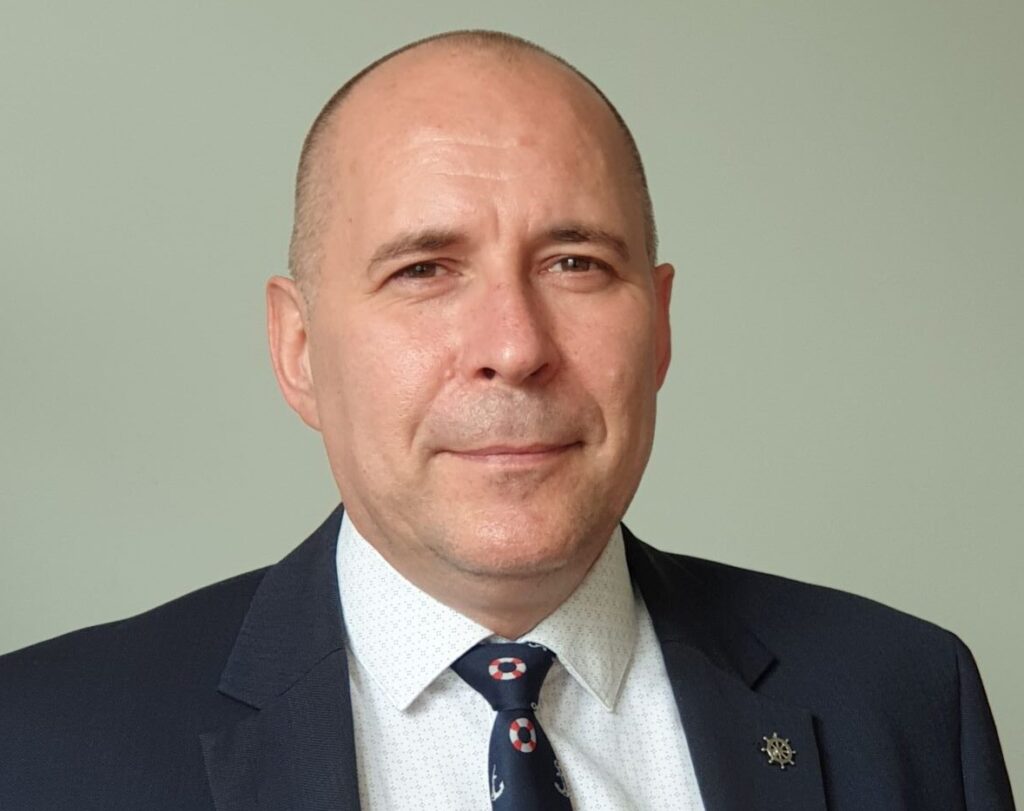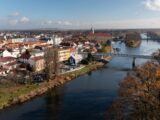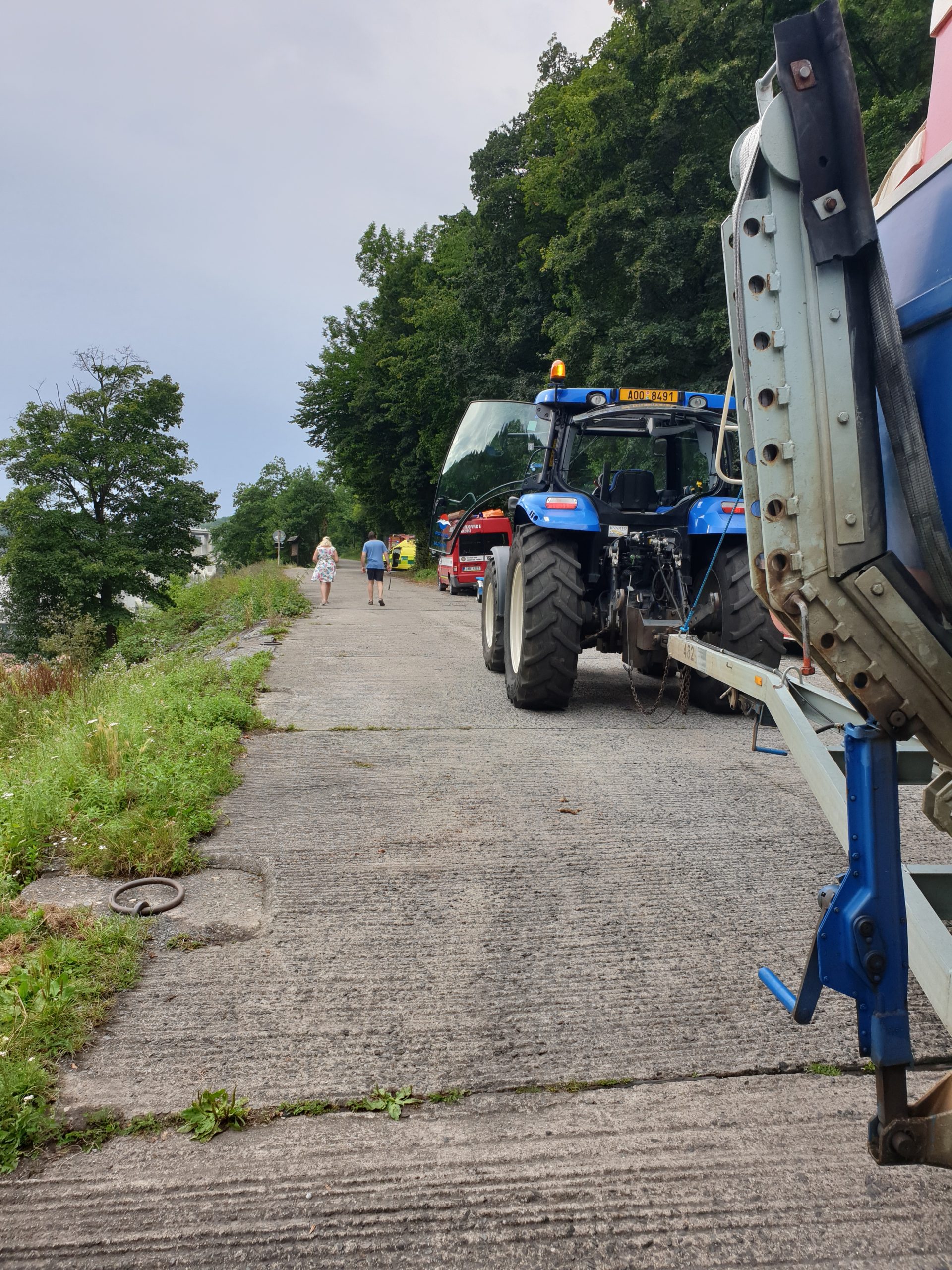
Ing. Lubomír Fojtů – at ease on the water with the Director of the Czech Water Management Authority
13. 2. 2023
He graduated from the Maritime University in Odessa. „Emotions, lay views of the public and interest groups, but unfortunately also of some authorities, enter into buildings such as the Děčín Cruise Stage. If ideology prevails, it is difficult to find a common language“ said, among others, Ing. Lubomír Fojtů.
Hello, Mr. Director, I would like to ask you to introduce yourself and the RCV CR in a pilot interview for lodime.cz magazine.
We were wondering if you have any closer relationship to the water or is this purely a managerial position?
LF: I graduated from Odessa Maritime University and immediately after graduation in 1988 I started working for Czechoslovakian Shipping Labska, where I was with short breaks until 2013. Since 2014 I have a Small Craft Leader’s license and I spend my short summer holidays mostly on a boat or at least on a paddleboard. It’s definitely not just a job for me.
What is the Waterways Directorate responsible for on the waterways ? Is it investment, management and operation of wharves, locks etc. ? Please describe the activities of the CRWC . I mean how to differentiate other organizations like Basin , SPS, RIS management etc.
LF: The Waterways Directorate of the CR, established by the Ministry of Transport, serves to develop waterways and provides services that other organisations do not provide. The State Waterways Enterprises manage the river basins, including maintenance and operation of water structures, while the CR Waterways Directorate improves the parameters of the waterways, such as increasing draft or new navigation.
For example, we have recently newly rafted the Vltava River from Týn nad Vltavou to České Budějovice. Today, the Vltava River Basin operates newly built locks. We have used the State Transport Infrastructure Fund, which also finances motorways and railways, to finance these projects.
The Waterways Directorate manages the new public ports and provides support services there, such as connecting ships to electricity and water.
The State Navigation Administration is the navigation authority, thus constituting the administrative authority for the supervision of navigation and waterways in the country.
Construction on water and completed buildings.
How the preparation and actual construction of a wharf or lock takes place from design to completion. Let us imagine , what are the pitfalls around this that are not revealed to us ? See, for example, the Děčín navigation stage and others.
LF: The construction of a wharf or a whole lock is a classic infrastructure construction and the process of its preparation and implementation can be compared to some extent with other road or motorway constructions. Due to the extremely complicated legislation and the need to secure a number of parallel or successive permits, the process of preparing the construction is several times more demanding than the actual construction. The sequence of steps from surveys, cost-effectiveness assessments, environmental impact assessments, multi-stage design and a whole range of permits, such as planning permission, building permits, impacts on protected species, felling, property security and many others is basically similar for all types of construction. For simpler constructions, e.g. wharves, some tasks can be merged or are not relevant at all, but even so the preparation always takes several years. The actual construction sometimes requires only a few months. The preparation of new locks is demanding – geological surveys, hydrotechnical calculations and modelling in the laboratory are necessary for safe and comfortable operation, but also to address the effects on nature.
We have to carry out a lot of surveys and research and there is often no willingness to look for constructive solutions and make decisions. Through cooperation with the authorities, we have successfully implemented some waterway structures that have not caused a disaster in nature and there are no visible traces of the construction site.
Waterway structures have the specificity of being multidisciplinary and fulfilling more transport purposes than, for example, roads or railways. We always have to deal with cooperation between transport and water management, which means cooperation between two ministries with their own ministries. We also need to address the crossing of waterways with roads and railways, where new bridges must accommodate both modes of transport. Reconciling these different interests often requires a lot of effort and time. In the Czech Republic, despite the limited scope of construction on waterways, we have experts who know about special underwater foundation, working under the protection of sumps and other specialties.
The boating season for recreational vessels is slowly coming to an end. What has been accomplished this year in terms of planned investments for recreational, cargo and passenger boating?
A characteristic of waterway investments is their relatively small number and the dramatic differences between their size and form. In 2021, we completed a project to raise the underbridge heights on the Vraňany Hořín canal, this year we will complete the raising of 2 bridges on the Troja – Podbaba canal in Prague, and we are building several new wharves on the Elbe for recreational and passenger navigation, as well as upgrading the vessel berth in Hamburg.
What is planned for next year ? And can you mention a few key projects that are in the pipeline for the Elbe to České Budějovice navigation by 2030?
Next year, we plan to continue the construction of other wharves on the Elbe River and expand the Strážnice wharf on the Bata Canal. We want to extend the Bata Canal southwards to Hodonín through the Rohatec lock and deepen the Vraňano-Hořín Canal. Also we are trying to build a ship lift at Slapy and to build new service ships for Prague and the Slapy and Orlik reservoirs, which will provide ecological services for all vessels. We are working on other projects, such as the construction of additional ports and infrastructure improvements for small and large shipping.
Děčín cruise stage, shipping, citylogistics and recreational boating.
Leaving aside ecology and finance, which three projects would you implement from your point of view today?
I have already mentioned a number of projects we are working on and we would prefer to implement them as soon as possible if it were not for the complex administrative procedures and to some extent the limited capacity of the designers.
The top priority is to stabilize Elbe navigation with the Děčín navigation stage. Business flexibility is crucial for economic and logistics success. Land transport for shipments to/from Germany is full, but water transport allows imports from any Western European port.
Waterborne transport has the potential to solve transport problems in urban areas and can be effective for transporting waste and goods.
We are collaborating with cities to secure financing for urban waterway projects, and utilizing eco-friendly propulsion for this vessel; projects include extending navigation on the Elbe River to Pardubice and creating a new port zone in Hamburg.
Is there sufficient support for waterways and navigation infrastructure from the Ministry of Transport?
LF: Water transport, being a smaller transport sector than road or rail, reflects the limited range of activities carried out. However, constraints to further development of waterways infrastructure are outside the Ministry of Transport.
How is the cooperation with governmental organisations, ecologists and cities ?
LF: Cooperation between state and cities is successful but challenges arise due to multi-departmental waterway infrastructure and varying funding opportunities. Excellent cooperation with cities. In some cases, finding common ground is necessary when city leaders‘ wishes cannot be easily financed by public waterway funds. We value the constructive cooperation of environmental experts on several projects, including successful implementation of environmental measures on the Vltava River. Unfortunately, in some places it is more a matter of ideology and there it is difficult to find common ground.
Are cities interested in building urban piers and wharves ? Are there plans to further expand the marinas for recreational boating ?
LF:Several towns on the Elbe and Vltava rivers are interested in building public wharves after seeing the success of recreational cruises on the Bata Canal in Moravia. Developing marinas can be challenging due to permitting procedures, but city leaders recognize the tourism potential of recreational boating through a public dock. Some locations have seen unexpected opposition from residents, leading to delays in marina preparation.
Wouldn’t it be reasonable and fair for public moorings ( e.g. Vrbné , Hluboká, Dr. Edvard Beneš ) to always draw annual leases from the applicants for each year?
LF: First of all, we have to distinguish between public ports and short-term berths. At marinas, we prioritize continuity for vessel charter owners, despite being fully occupied for long-term berths. For visitors, berths are limited to 48 hours, but we plan to incentivize leisure vessel rentals.
Do you sail on a boat yourself and which parts of the Czech Republic or European routes would you recommend.
LF: I’ve sailed on small vessels on the Elbe, Vltava and Bata Canal and I would recommend any of them. I’ve been on a sea yacht, and I can also recommend that as a great active holiday. Unfortunately, when you build waterways in the Czech Republic, you don’t have much time to enjoy them either. It’s very hard work and the results are slow to come.
The current construction on Orlik is on schedule ? Won’t it jeopardize the navigation season next year as it did this year ?
LF: You are probably asking about the construction of the emergency spillway at the Orlík dam, which is being carried out by the state enterprise Povodí Vltavy. The Czech Republic Waterways Directorate cannot provide any information on this matter, please contact your colleagues.
What would you like to say to the readers of lodime.cz ?
LF: Holidaying in a houseboat has long been the privilege of the well-to-do. Today you can rent one on the Elbe, Vltava, Bata Canal and some lakes. You don’t need a small boat licence to rent a boat, the owner of the rental company will train you and you can sail. Our country is beautiful, which most of us know from the perspective of a pedestrian, motorist or cyclist. The view from the water adds another dimension and is definitely something to behold. And if you fall into this hobby, more than 30,000 km of waterways throughout Europe are open to you, accessible via our Elbe River.
Thank you for the interview and we wish you good sailing both in life and on the water.


